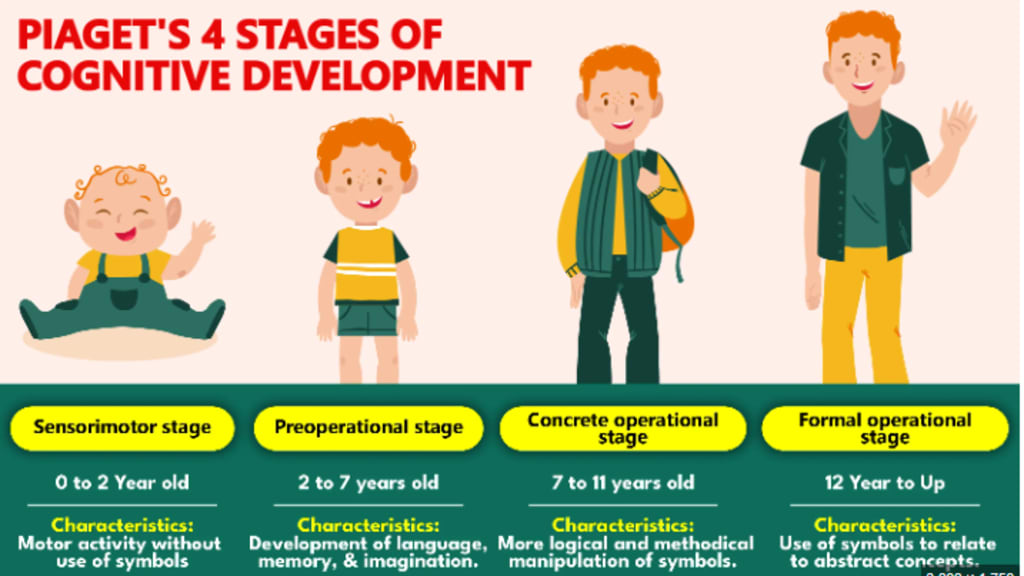Understanding Piaget's Theory of Cognitive Development
The Complete Guide

Jean Piaget's theory of cognitive development is a cornerstone in the field of developmental psychology, shedding light on how children construct knowledge about the world and progress through distinct stages of intellectual growth. Piaget's work emphasizes the interplay between innate capabilities and environmental influences, highlighting the dynamic nature of cognitive development from infancy to adulthood.
Jean Piaget: Pioneer of Cognitive Development
Jean Piaget (1896-1980) stands as one of the most influential cognitive theorists in the realm of child development. His curiosity was sparked by observing his own children's cognitive evolution, leading him to recognize and map out the unique ways in which children's intelligence differs from that of adults. Piaget's ground-breaking research revealed that children's intellectual skills evolve over time due to maturation rather than mere training, with children of varying ages interpreting the world through different cognitive lenses.
Piaget's theory of cognitive development is rooted in the concept of constructivism, which posits that individuals actively construct their own knowledge and understanding of the world through experience and interaction. This process of knowledge construction is not a passive absorption of information but rather an active process of assimilation and accommodation.
Key Concepts in Piaget's Theory
Piaget's theory revolves around the notion of cognitive equilibrium, where individuals strive to maintain a balance in their understanding of the world. Children, in particular, face the challenge of assimilating new information into existing mental frameworks (schemas) or accommodating these frameworks to accommodate novel experiences. This process of assimilation and accommodation forms the bedrock of cognitive development, driving individuals to make sense of new situations by aligning them with their existing cognitive structures.
Assimilation refers to the process of incorporating new information into existing schemas, while accommodation involves modifying existing schemas to fit new experiences. When individuals encounter information that contradicts their current understanding, they experience cognitive dissonance, which motivates them to resolve the conflict through assimilation or accommodation. This dynamic interplay between assimilation and accommodation is essential for maintaining cognitive equilibrium and promoting cognitive growth.
Kickstart your online biz for FREE! Explore FE Unleashed Sales Machine🚀 (click here)
Stages of Cognitive Development
Piaget proposed a theory of cognitive development that unfolds in four distinct stages:
Sensorimotor Stage: Birth to 18-24 months, focusing on object permanence and the development of motor skills. During this stage, infants learn that objects continue to exist even when they are out of sight, and they begin to experiment with different actions to achieve desired outcomes.
Preoperational Stage: 2 to 7 years old, marked by symbolic thought and the development of language. Children in this stage are able to represent objects and events using symbols, such as words and images, but their thinking is often egocentric and lacks logical reasoning.
Concrete Operational Stage: Ages 7 to 11 years, characterized by logical thought and the ability to classify objects based on their attributes. Children in this stage can solve problems that involve concrete objects and events, but they may still struggle with abstract concepts.
Formal Operational Stage: Adolescence to adulthood, involving scientific reasoning and the ability to think hypothetically. Individuals in this stage can engage in abstract thought, consider multiple perspectives, and use deductive reasoning to solve problems.
Each stage represents a qualitative shift in cognitive abilities and world comprehension, with children progressing through these stages at varying rates. While no stage can be skipped, individual differences exist in the pace of development, and some individuals may not reach the later stages.
Kickstart your online biz for FREE! Explore FE Unleashed Sales Machine🚀 (click here)
Implications and Critiques
Piaget's theory has significantly influenced developmental psychology, particularly in the realm of education and child development. His insights have led to the creation of developmentally appropriate curricula and teaching methods that take into account children's cognitive abilities and learning styles. For example, the use of hands-on activities and concrete examples in early childhood education is largely inspired by Piaget's theory.
However, critiques of his work point to shortcomings such as overestimating adolescent abilities, underestimating infant capacities, and neglecting cultural and social factors in cognitive development. Some researchers argue that Piaget's stages are not as distinct or universal as he proposed, and that cognitive development is more continuous and influenced by contextual factors.
Despite these criticisms, Piaget's contributions have paved the way for understanding how children acquire conscious control over their intellect and behavior, shaping the landscape of cognitive development studies. His theory has inspired numerous research studies and has been adapted and expanded upon by other theorists, such as Lev Vygotsky and Jerome Bruner.
In conclusion, delving into Piaget's theory of cognitive development unveils a rich tapestry of intellectual growth, highlighting the intricate interplay between nature and nurture in shaping human cognition. By grasping the essence of Piaget's stages and key concepts, we gain profound insights into the fascinating journey of cognitive maturation from childhood to adulthood. While Piaget's theory may not provide a complete picture of cognitive development, it remains a valuable framework for understanding and supporting children's intellectual growth.
Kickstart your online biz for FREE! Explore FE Unleashed Sales Machine🚀 (click here)
About the Creator
Enjoyed the story? Support the Creator.
Subscribe for free to receive all their stories in your feed. You could also pledge your support or give them a one-off tip, letting them know you appreciate their work.





Comments
There are no comments for this story
Be the first to respond and start the conversation.